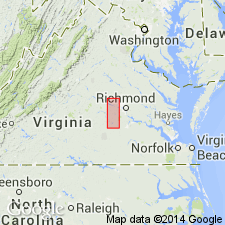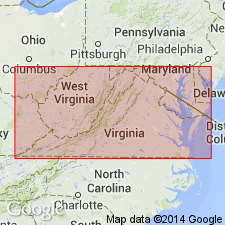
- Usage in publication:
-
- Chesterfield group*
- Modifications:
-
- Named
- Dominant lithology:
-
- Sandstone
- AAPG geologic province:
-
- Piedmont-Blue Ridge province
Summary:
The upper division of the Newark series in the Richmond basin is here named the Chesterfield Group. It includes the Vinita Beds and the Otterdale Sandstone. Overlies the Tuckahoe Group. Thickness is more than 2,500 ft (760 m). Age is Late Triassic.
Source: GNU records (USGS DDS-6; Reston GNULEX).

- Usage in publication:
-
- Chesterfield Group
- Modifications:
-
- Not used
- AAPG geologic province:
-
- Richmond basin
- Piedmont-Blue Ridge province
Summary:
Nomenclature in this report follows Ediger and others (in prep). Richmond basin sequence is divided into three formations (ascending): Tuckahoe, Turkey Branch, and Otterdale Formations of Newark Supergroup. Chesterfield Group not used. In this report, Vinita beds, formerly assigned to Chesterfield, is considered a member of the Tuckahoe Formation.
Source: GNU records (USGS DDS-6; Reston GNULEX).
For more information, please contact Nancy Stamm, Geologic Names Committee Secretary.
Asterisk (*) indicates published by U.S. Geological Survey authors.
"No current usage" (†) implies that a name has been abandoned or has fallen into disuse. Former usage and, if known, replacement name given in parentheses ( ).
Slash (/) indicates name conflicts with nomenclatural guidelines (CSN, 1933; ACSN, 1961, 1970; NACSN, 1983, 2005, 2021). May be explained within brackets ([ ]).

